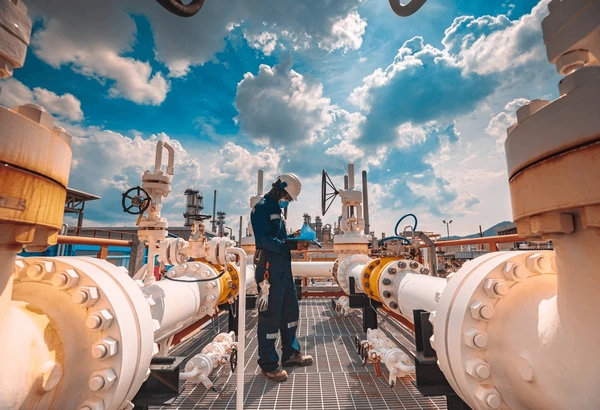
At the beginning itself, I would like to emphasize that this blog is written entirely from firsthand, in-field experience gained over years in the valves industry and definitely not generated by AI. As you read further, I trust this perspective will be evident, and I appreciate your patience and attention.
The valves industry in the Middle East is not just about supply and demand, it’s about navigating one of the most unforgiving business environments in the world. With end users like Aramco, BAPCO, Qatar Energy, and KOC setting the highest possible standards, traders walk a fine line every single day. One mistake can mean a million-dollar rejection. One wrong choice can ruin years of credibility.
This business is a constant balancing act. Sometimes when you go too deep into negotiations, obsessed with squeezing every penny, you end up sacrificing both the end product and the service. The real goal is finding that perfect middle ground: paying the right money for the right product and securing the right partner to deliver it. Balance is achieved by avoiding obsession with one single factor whether it’s price, speed, or reputation and instead keeping options open, learning from past experience, and preparing for worst-case scenarios when experimenting with new suppliers.
Money itself is just a number. But its perceived value is powerful. For some, it becomes a tool to control others; for others, it blinds them to the bigger picture. In reality, complete satisfaction requires readiness to spend good money, because unfortunately, most people in this industry have seen too many shortcuts. They will treat every deal as a case-by-case battle. Unless you are dealing with someone who already has too much or has learned the hard lessons, don’t expect others to “understand you.” You will always face skepticism, and that is why preparing for the worst is not optional, it’s survival.
Lessons Learned in Valves Trading
Over the years in valves trading across the GCC, I have personally faced several challenges that shaped how I view this business. These are not abstract theories, but real mistakes and lessons, and they apply whether you’re dealing with giants like Aramco or smaller contractors who you hope to retain for the future.

1. Mistakes in MTCs and QC — Rookie Errors That Cost Millions
The most basic but also the most dangerous error is mistakes in Material Test Certificates (MTCs). Whether it’s a wrong heat number, incorrect chemical composition, or mismatched mechanical properties, end users take these details extremely seriously. To a trader, it might look like a minor clerical error. To Aramco or BAPCO, it’s grounds for immediate rejection.
I’ve seen shipments worth hundreds of thousands of dollars rejected because the paperwork didn’t align with the actual material. For traders importing into Saudi, Bahrain, or Qatar, this is devastating. That’s why weak quality control is the fastest way to kill your business. You can’t afford to check products “lightly.” Every valve, every certificate, every report must be reviewed with the same seriousness as if you were the end user.

2. Choosing the Wrong Supplier to Save Money
When you try to save too much money or chase unrealistic margins, you often end up with the wrong supplier. And in this business, the saying holds true if it’s too good to be true, it probably is.
I’ve faced this myself. The temptation to save a few dollars on cost can quickly turn into huge losses when the supplier fails on quality or documentation. There are only two strategies to deal with this:
- Avoid such suppliers completely.
- Take calculated risks. Meaning: never bet so much on a new or risky supplier that if they fail, you’re left with nothing. Always ensure you can still complete the job, even if the supplier collapses.
In a region where Aramco, ADNOC, KOC, and Qatar Energy expect consistent compliance, gambling with suppliers is one of the fastest ways to be blacklisted.

3. Pushing for Sales When You Need Marketing
This is one of the most misunderstood points in the trading business. Many companies think sales is about sending people into offices to push products down procurement managers’ throats. But sales without marketing is like trying to build a house without a foundation.
Marketing creates awareness, sales converts it.
When Aramco or BAPCO engineers are looking for specific valves like API 600 gate valves in Super Duplex or API 598-tested globe valves they need to already know who you are. If your marketing hasn’t put your name in front of them, then your sales team is wasting effort.
Salespeople should not be doing the work that marketing should have done. Without marketing, there can be no sustainable sales. This is one of the biggest mistakes I’ve seen companies make in the Middle East valve industry focusing on short-term sales pushes instead of long-term brand-building.
4. Accumulating Too Much, Knowing Too Little
Another common trap is trying to sell everything to everyone. Many traders think they can cover every product line valves, fittings, flanges, gaskets, pumps, and more. The reality is that when you try to sell everything, you end up selling nothing.
Amazon is often used as an example of “selling everything.” But Amazon is not a trading company it’s a logistics company that connects buyers and suppliers on one platform, and even then, it specializes in logistics as its core.
In valves trading, specialization is the key. If you don’t focus, you spread yourself too thin, and eventually you collapse. The way I see it, traders should dedicate at least three months of proper hard work on one specialization without expecting results. After that, progress should be measured monthly. If after six months to a year there’s no growth, then pivot. But never keep accumulating products blindly, hoping something will work.
5. Not Valuing Good People
Perhaps the most overlooked mistake in this business is undervaluing good people. Too often, after being cheated by a bad supplier or a dishonest partner, traders end up falling into another trap, repeating the same loop.
The real question is: when did you last appreciate the good ones?
- Did you reward the supplier who consistently delivered quality?
- Did you acknowledge the employee who stayed loyal during a crisis?
- Did you strengthen ties with the client who gave you your first break?
If not, you’re playing a dangerous game. The more you push good people aside in the name of being “too smart” with pennies, the more you invite disaster. Good relationships are the backbone of trading in the Middle East. Companies like Qatar Energy or BAPCO notice how you treat your partners — and that treatment reflects on your credibility.
The Bigger Picture
At the end of the day, valves trading or any trading in general in the Middle East or elsewhere in the world, is much more than pricing. It’s about mindset. Money is always a number, but the value of that number is relative. For some, it’s a tool to control. For others, it’s a fantasy that blinds them.
The truth is mistakes will happen during exploration. Risks are part of this business. But they should never lead to your fall. Don’t be overly optimistic, and always prepare for worst-case scenarios. One wrong shipment can cost you a lot.
If you want to survive in this business:
- Respect quality.
- Choose suppliers wisely.
- Invest in marketing, not just sales.
- Focus on specialization.
- Value the good people around you.
The Middle East is home to some of the biggest end users in the world Aramco, BAPCO, Qatar Energy, KOC — and they operate with standards that leave no room for error. Traders who learn to balance cost, quality, and relationships will thrive. Those who don’t will keep repeating the same loops, until the market forces them out.
At GCCValves.com you will find more blogs about the industry and the products also for Valves. For Piping related accessories you can check out MiddleEastPiping.com
